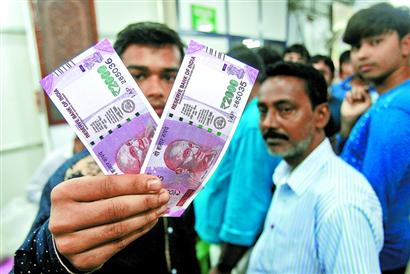Finance and economics: Money in India: Taking notes
財經:印度的貨幣:兌換鈔票
The government transforms base money into nothingness (and gold) .
政府把基礎貨幣變得一文不值(以及金本位)。
Not much distinguishes a valuable banknote from any old piece of printed paper, as Indians discovered this week.
本周,印度民眾發現有價值的紙鈔和舊版的打印紙沒有太大差別。

In a surprise televised address on November 8th, Narendra Modi, the prime minister, announced that the country’s two highest-denomination notes, worth 500 and 1,000 rupees ($7.50 and $15) , were to be legally worthless with near-immediate effect.
在11月8日,印度總理納倫德拉-莫迪在一場令人震驚的電視講話中宣布,本國兩種最高面值的紙幣,即500和1000盧比(約7.5美元和15美元)將在近期被正式廢除使用。
This odd variant of alchemy is the latest in a series of moves to curb illicit income; economists hope long-term gains will justify a chaotic spell as India adapts.
這種讓人摸不著頭腦的紙幣轉變政策是打擊不正當收入的一系列行動第一步。經濟學家希望長遠好處會讓印度所經歷的混亂政策變得有意義。
The idea is not as barmy as it might first appear.
這個想法可能并沒有乍看之下那么瘋狂。
Mr Modi has implemented a flurry of schemes to flush out “black money”, the term Indians use for cash which is both unaccounted for and outside its formal financial system.
莫迪先生實施了一系列計劃來打擊“黑錢”,這個詞被印第安人用來描述除現金以外下落不明或游離在其正規金融系統之外的非法現金。
Piles of ill-gotten income have long been easy to launder into gold or property, where using notes for at least part of a purchase is the norm.
成堆的非法收入現金長期以來可以輕易洗白成黃金或者地產,因為這些在交易過程中一般至少使用部分紙鈔。
“Demonetising” high-value tender means existing notes must be traded in at banks and post offices before the end of the year.
廢除大額貨幣流通意味著在今年年底之前,現存的紙幣必須在銀行或者郵局被換掉。
That will force those with suitcases of cash either to come clean or to renounce their loot.
這將迫使那些擁有成箱現金的人要么證明自己的錢是干凈的,要么放棄他們的非法收入。
Still, it is dramatic: central banks usually balk at moves that call into question the legal worth of the notes they issue.
不過,這是戲劇性的:中央銀行通常在對他們發行的票據的法律價值引起質疑的政策上猶豫不決。
The hastily discontinued tender represents 86% of all the currency in circulation (equivalent to 11% of GDP) in a country where cash remains king.
這些倉促地中斷貨幣流通行為包括了在現金仍然占主導地位的國家中的86%的流通中的貨幣(相當于GDP的11%)。
Many Indian residents found themselves with little still-legal cash on hand ahead of a forcibly imposed bank holiday and a two-day shutdown of ATMs.
因為面對銀行強制休假和自動取款機關閉的兩天,許多印度居民發現自己手里幾乎沒有合法的現金。
A senior bank executive in Mumbai admitted to raiding his daughter’s piggy bank to pay for tolls on his way to work.
在孟買,銀行高管說他打破他女兒的存錢罐支付上班路上的通行費。
The prospect of life with little or no cash, at least for a few days, cheered those who think Indians should be switching to smartphone apps and card-based payments, which are easier for the authorities to track and tax.
只有少量現金或者沒有現金的生活景象(至少那幾天是)鼓舞了那些認為印度應該使用手機應用和銀行卡付款的人,他們覺得手機應用 銀行卡付款方便當局追蹤和收稅。
That laudable aim will take time in a country where nine out of every ten workers still toil in the informal sector.
這個值得稱贊的目標在絕大數工人仍然工作在非正規部門的國家的實現需要時間。
Though the number of Indians with bank accounts has risen sharply thanks to a government financial-inclusion scheme, most savings are still held outside the banking system.
盡管印第安人與銀行賬戶的數量急劇上升得益于政府的金融包容計劃,大多數儲蓄仍在銀行體系之外。
One-fifth of total economic output is said to be informal.
五分之一的總經濟產出據稱是非正式的。
Banks are among those who should gain from the scheme: much cash now secreted under mattresses should make its way into their coffers or into the mutual funds they offer.
銀行是這項計劃的獲益者之一:大量藏匿于床下的現金應該會進入他們的金庫或者是他們提供的共同基金。












